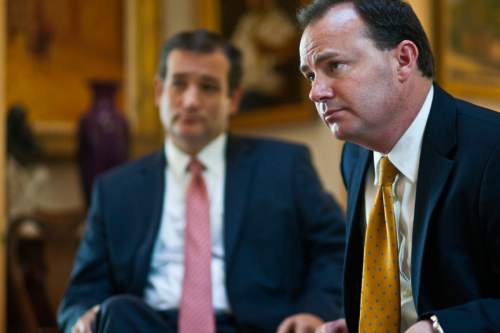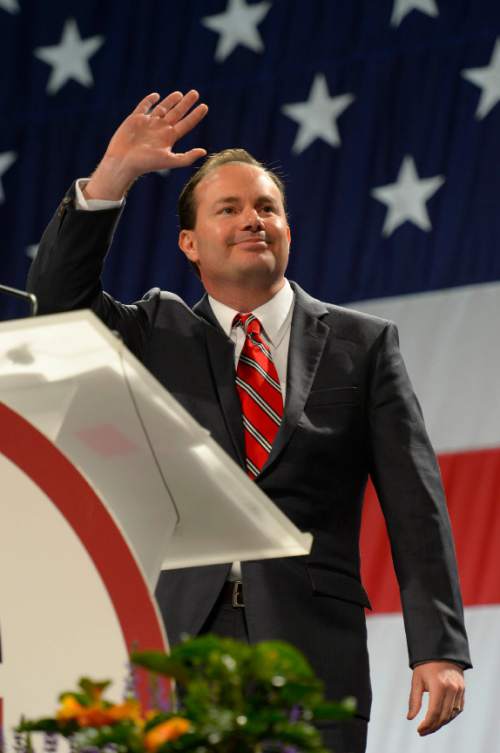This is an archived article that was published on sltrib.com in 2014, and information in the article may be outdated. It is provided only for personal research purposes and may not be reprinted.
The first crop of candidates to go through Utah's new nominating process in 2016, if it holds up in court, will include Gov. Gary Herbert, the four Utah House members and — perhaps most notably — Sen. Mike Lee.
Herbert, according to a new poll, won't have any problems. He's got a 74-percent favorability rating.
Lee, though, does appear more vulnerable.
A slight majority — 52 percent — view him favorably, while 45 percent have an unfavorable impression, according to the poll released this week by the Center for the Study of Elections and Democracy at Brigham Young University. Nearly one-third of those have a strongly unfavorable perception.
Under the reforms in SB54, now being challenged in a lawsuit filed by the Utah Republican Party, a broader sampling of voters would have a bigger say in choosing party nominees than under the current caucus-convention system dominated by conservatives.
Still, Lee is popular among Republicans — who still would dominate the selection process — earning a 70-percent favorability rating.
"He's doing better among that group and that's the group that matters for the primary or convention," said Chris Karpowitz, director of the BYU center. "He's still vulnerable and I think a primary is always going to be more of a concern for him than a convention, but it's not clear to me he would definitely lose a primary."
In fact, Lee's overall approval rating of 52 percent is a substantial improvement from a year ago when, on the heels of waging an intense budget battle that led to the federal government shutdown, Lee's favorability was at just 40 percent and 56 percent had an unfavorable impression, with 43 percent strongly unfavorable.
"What I see is that Senator Lee's favorability bounced back significantly over the past year from a really terrible place immediately following the government shutdown when he was, I think, quite vulnerable and had favorability ratings that were far below anybody else in the state," said Karpowitz.
It's Lee who some have suggested may be the target of the effort by Count My Vote to change the nominating system, ultimately leading to the passage of the reforms in SB54 that dilute the power of delegates in the caucus-convention process. The changes allow a candidate to bypass the party convention by collecting enough signatures to get on a primary ballot and also opens the GOP primary to voters not registered as Republicans.
Utah Republican Party Chairman James Evans has protested that, if the court rejects the lawsuit challenging the constitutionality of SB54, the GOP needs more time to make the required changes — at least until 2018. But he says Count My Vote organizers insisted that implementation by 2016 was non-negotiable.
"To me, they just have an end game for a particular election cycle," Evans said, although he wouldn't name Lee specifically. "Everyone needs to ask the question: What else is going on here?"
Others are more direct.
State Sen. Scott Jenkins, R-Plain City, who is committed to undoing the nominating changes in SB54, thinks the changes are squarely focused on ousting Lee. If SB54 survives, he said, he expects former Gov. Mike Leavitt, one of the founders of Count My Vote, to challenge Lee in a Republican primary.
Rich McKeown, co-chairman of Count My Vote and a longtime associate of Leavitt, says that absolutely is not the case.
"I think I can speak pretty definitively that that is not [Leavitt's] objective," he said. "That's not what he intends to do and that is not of any interest to him."
The genesis of Count My Vote goes back to 2009, before Lee ousted three-term Sen. Bob Bennett in 2010, and is focused on increasing voter participation.
"It's never been about an individual or an outcome," McKeown said. "That's just not a motivation at all."
Boyd Matheson, Lee's chief of staff who is transitioning to run his political operation, said Lee really wants to know what the nominating system will look like in 2016.
"Senator Lee will win the Republican nomination regardless of what system is in place," Matheson said. "What Senator Lee wants is certainty in the system, so the sooner this [lawsuit] is resolved, the better for the party, candidates, and all involved." —
Other Utahns in Congress
• Sen. Orrin Hatch has said he will not run for an eighth term. That may be a wise move politically.
He is viewed unfavorably by 49 percent of voters, according to the BYU poll. Exactly half have a favorable impression.
• Congresswoman-elect Mia Love appears to have some bridge-building to do, the survey suggests. An underwhelming 47 percent view her favorably, while 42 percent have an unfavorable perception.
• Rep. Rob Bishop has a 50-percent favorability rating, with 34 percent viewing him unfavorably, according to the BYU poll.
• Forty-five percent give Rep. Chris Stewart a thumbs up, with fully 29 percent saying they have no opinion of him after his convincing re-election to a second term.
• Rep. Jason Chaffetz was favored by 57 percent of the respondents, and 39 percent viewed him unfavorably.
Source: The Utah Voter Poll from BYU's Center for the Study of Elections and Democracy was an online survey of voters recruited during the last five elections. The sample size was 657 voters and has a margin of error of 3.64 percent. The poll was completed Nov. 14-23 and was released Tuesday.





